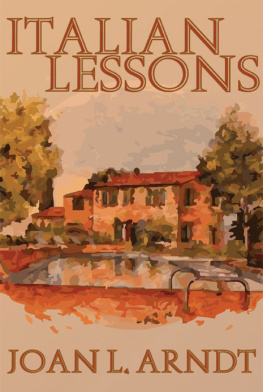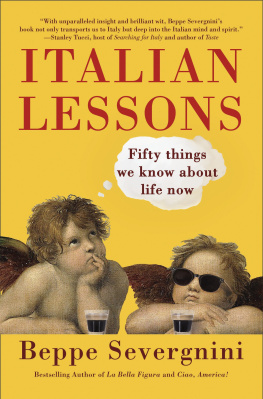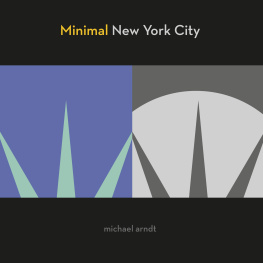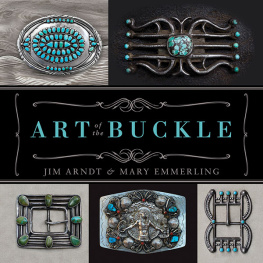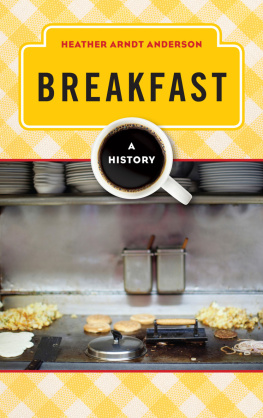Joan L. Arndt - Italian Lessons
Here you can read online Joan L. Arndt - Italian Lessons full text of the book (entire story) in english for free. Download pdf and epub, get meaning, cover and reviews about this ebook. year: 2007, publisher: Knepper Press, genre: Non-fiction. Description of the work, (preface) as well as reviews are available. Best literature library LitArk.com created for fans of good reading and offers a wide selection of genres:
Romance novel
Science fiction
Adventure
Detective
Science
History
Home and family
Prose
Art
Politics
Computer
Non-fiction
Religion
Business
Children
Humor
Choose a favorite category and find really read worthwhile books. Enjoy immersion in the world of imagination, feel the emotions of the characters or learn something new for yourself, make an fascinating discovery.
- Book:Italian Lessons
- Author:
- Publisher:Knepper Press
- Genre:
- Year:2007
- Rating:5 / 5
- Favourites:Add to favourites
- Your mark:
- 100
- 1
- 2
- 3
- 4
- 5
Italian Lessons: summary, description and annotation
We offer to read an annotation, description, summary or preface (depends on what the author of the book "Italian Lessons" wrote himself). If you haven't found the necessary information about the book — write in the comments, we will try to find it.
Italian Lessons — read online for free the complete book (whole text) full work
Below is the text of the book, divided by pages. System saving the place of the last page read, allows you to conveniently read the book "Italian Lessons" online for free, without having to search again every time where you left off. Put a bookmark, and you can go to the page where you finished reading at any time.
Font size:
Interval:
Bookmark:

RFA, Inc. (Boca Raton, FL)
First Digital Edition
www.levigne.net
www.facebook.com/levignevilla
Copyright 2008, Joan L. Arndt.
All rights reserved.
Originally printed in the United States of America by Knepper Press, Pittsburgh, Pennsylvania.
Publisher RFA, Inc., Boca Raton, Florida ().
Library of Congress Cataloging-in-Publication Data
Arndt, Joan L.
Italian lessons / Joan L. Arndt
Library of Congress Control Number : 2008934773
ISBN: 978-0-615-60355-1
First Print Edition: September 2008
First Digital Edition: June 2012
ePub Conversion by Primedia eLaunch
Cover art by T. Clayton Arndt based on the ceramic artistry of Valentina Belia.
Other design work by T. Clayton Arndt.
T. Clayton Arndt ()
Valentina Belia ()
Photos courtesy of Albert Davis, Pat Deschner, Mary Baum, Beth Hosking and Roger Arndt
Dedicated to the life and memory of my father,
Thomas F. Lombardi
1923 - 1999
Acknowledgments and Authors Note
Our corner of paradise is part of a very small Italian community. We thrive here by the grace of our friends and neighbors to whom we are indebted. They demonstrated ready acceptance of two strangers and it is with tremendous affection and profound appreciation that I have written of our experiences. Real names and places have been used in most but not all instances. The timing of certain events has been compressed for the sake of storytelling.
I owe thanks to many but of special note are Lisa and Albert Davis who agreed to read my manuscript and provide comment to a first-time author. There were times when procrastination seemed my closest friend. Lisa and Albert exercised mighty restraint when physically pushing me forward was their preferred course of action. Thanks also to Clayton Arndt, commercial airline Captain, graphic designer and InDesign expert, who planted himself in front of a computer and worked magic to create a book from a manuscript. To all who read my journals and flatteringly enough asked for more, I send gratitude. You made me believe that another book about Italy was not superfluous. Finally, grazie to Roger for without him there would be no Italian lessons worth learning.
J.L.A.

 Come mai?
Come mai?
The old woman walking through our olive grove carried a large knife. In most settings flashing a blade would be perceived as menacing but her semi-toothless smile mitigated the threat. While it was spring of 2003, a sepia-toned photo could easily have plunged her into the mid-1800s and a painting would have transported her centuries earlier. Her simple print housecoat was long and tattered; a mismatched kerchief covered her head. She wore dark sensible shoes with sagging wool stockings and carried a burlap sack slung across her chest bandolier style.
My husband Roger wanted me, the Italian speaker in the family, to have a chat with her and find out what she was doing in our olive grove. She lifted the knife as I approached so I was cautious despite Rogers desire for me to be anything but. Her smile remained. She said she was harvesting the greens growing wild among the poppies. She pointed with the knife and while they looked like mere weeds she said they were delicious when boiled and seasoned with salt and olive oil. In Italy it often comes down to food.
She would stay out of the grove in the future but we should know that without fencing anyone was free to enter. We had the ancient Romans to thank for the ready access to unenclosed private property. That explained the occasional motorcycle tracks through the field as well as hunters and their dogs but didnt lessen the sting of intrusion.
Italy is a study in contrasts and our grove wanderer exemplified our many contrasting experiences since we moved to this country. She carried a knife but wore a smile; she was polite and respectful, using the formal Lei when addressing me, but to our uninformed way of thinking, disrespectful by trespassing in our grove; she was garbed in what could easily be taken for Middle Ages peasant attire yet inhabited the 21st century; she harvested weeds that were destined to achieve an elevated culinary stature belying their lowly origin. Six months earlier we would have remained indignant by the exchange. Now it became just another notch in our educational belt. We were learning.
Luisa wanted to know more about us who we were and where we came from. I began the story and her eyes darted between us, a bemused expression on her face. She interrupted with the question were often asked, Come mai? Literally it means how never but the true meaning is Why, how come? She peppered us with all the other questions that follow the simple why - What in the world made you decide to move to Italy? How did you ever find this small town of Colombella? How could you take such a risk and leave everything? Werent you afraid to move to an unfamiliar place?
Were asked such questions often. After a while, we can see it coming -theres a slight tilt of the head and then in a mildly indulgent tone the question pours out, What motivated you to do this? Frankly there are days we ask ourselves the same thing but on those days our questioning is more exasperated, bordering on the colorful, edging toward the profane.
Come mai, indeed. These are certainly valid questions. They involve decisions not to be taken lightly, that impact many people and precipitate many changes. In the end our decision to move to Italy came down to one word, wanderlust. Not an Italian word, granted, but the desire to travel and understand another culture is what led us here. We had traveled extensively, together and independently, personally and professionally. We enjoyed learning about ancient civilizations and historical sites while sampling new foods and wines and the trappings of other lifestyles.
Travel to another country can pique ones interest but living in another country is altogether different. We wanted the full adventure. We wanted to know our neighbors, experience the seasons, plant vegetables and flowers and see things through resident, not visitor, eyes. We wanted more than an occasional peek under the tent. We were itching to learn what life could be like in another land and packing and unpacking bags for limited stays was not scratching the itch.
The wanderlust wasnt new. We married in March 1995 and waited until November, springtime in the Southern Hemisphere, to take our honeymoon in New Zealand. We spent three weeks driving through much of the country and found it enchanting. Its a diverse land ranging from glaciers to tropical forests, mountains to flat expanses of coastline. It is not densely populated; sheep easily outnumber people ten to one. It remains pristine, the people are friendly and theres a high standard of living.
On the southeastern coast of the South Island we discovered the small town of Oamaru, known for its quarries, penguins and tranquility. We found a house, the largest single-story wood structure on the South Island. It had been lovingly and painstakingly restored with attention to architectural details that included Italian marble fireplace surrounds and hammered tin ceilings. The owners lived on site and operated part of their home as a bed and breakfast as well as a fine-dining restaurant.
We lingered in sleepy Oamaru and it wasnt long before talk of purchasing and relocating and commuting began. The breakfast part of B & B gave me an anxious twinge but I didnt have to struggle with the concept for long. Despite all the talk, we never reached a satisfactory deal with the owners and ultimately New Zealand was simply too far from the United States for family, friends and full-time jobs firmly in place.
Next pageFont size:
Interval:
Bookmark:
Similar books «Italian Lessons»
Look at similar books to Italian Lessons. We have selected literature similar in name and meaning in the hope of providing readers with more options to find new, interesting, not yet read works.
Discussion, reviews of the book Italian Lessons and just readers' own opinions. Leave your comments, write what you think about the work, its meaning or the main characters. Specify what exactly you liked and what you didn't like, and why you think so.

